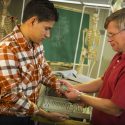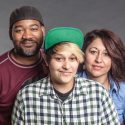Intersession class to explore LGBT civil rights
For years, the historical significance of the Stonewall Rebellion, the Mattachine Society and the GLF has been "in the closet" and largely unknown to mainstream America.
An upcoming University of Wisconsin–Madison summer intersession course will explore those topics, along with other people, places and issues of the Lesbian and Gay Civil Rights Movement, by taking 17 students on a two week, five-city bus trip around the Northeast.
The class, the Lesbian and Gay Civil Rights Movement, 1950-1970, is the innovation of Scott Seyforth, a graduate student in educational leadership and policy analysis, who also serves as a residence life coordinator for University Housing.
"This is a history that has been hidden and we are attempting to bring it more into view," he says. "We will be helping to contribute to an emerging field of study and meeting with people who changed the course of U.S. history, even if no one knows who they are."
Seyforth adds that the bus trip is a unique way for students to learn through first-hand experience and investigation.
"One of the things that makes this trip powerful is students become immersed in the project. Students are learning the issues from the time they wake up until they go to bed. That is very powerful."
The learning journey will begin in Madison, with lectures from UW–Madison alums and local LGBT rights advocates.
On May 29, students will board a bus headed to Washington D.C., where they will spend four days meeting with activists who organized and picketed at the first gay and lesbian civil rights demonstrations, along with others who successfully advocated the American Psychiatric Association to de-list homosexuality as a mental illness.
From Washington, the group will travel to New York City, where they will meet participants of the Stonewall Rebellion, who resisted police harassment against the gay and lesbian community at the Stonewall Inn in 1969.
During their three days in New York, the group will also visit the Lesbian Herstory Archives, the largest and oldest lesbian archive in the world.
Participants will learn about the activities of the histories of the Mattachine Society and GLF, or Gay Liberation Front, organizations of men and women which sought to bring gay and lesbian rights out of the background and into a more prominent place in American society.
Along the road, students will attend a church service at the traditionally African American LGBT Unity Fellowship Church in Baltimore and meet with the publisher of the Philadelphia Gay News in Philadelphia, Pa.
Susan Zaeske, associate professor of communication arts and faculty adviser for the trip, says the group will explore the political, religious and the cultural levels of LGBT life.
Zaeske also says she is thrilled with the diversity of students on the trip and hopes it will increase the learning experience.
"It’s quite an even mix [between LGBT and heterosexual students] and I think it is wonderful," she says. "LGBT history is so central to American society that people who are gay or straight know that gay rights are important. I am really heartened by that."
Student participant Kia Block hopes the trip will give her this understanding of LGBT issues and make her a better ally.
"I think I’ll come back with a better understanding of the history behind the LGBT movement and probably a newfound respect for what LGBT people have gone through in the past and are still going through," she says. "Hopefully I’ll come back a better ally with some new friends."
The bus trip is part of the curriculum for the LGBT certificate, new to UW–Madison in 2003. Sociology professor Joe Elder, another faculty leader of the trip, says this course is a way of the university showing its dedication to LGBT issues.
"At the moment, LGBT people are probably the most discriminated against," Elder says. "All discriminated groups face barriers. This trip is one way of bringing those barriers down."
The trip is sponsored by the LGBT Certificate Program, Pathways to Excellence, the LGBT Campus Center, University Housing, the Offices of the Dean of Students, the Vice Provost for Teaching and Learning, the Vice Provost for Diversity and Climate, the Women’s Studies Program, the Wisconsin Alumni Association and the Office of the Chancellor.


